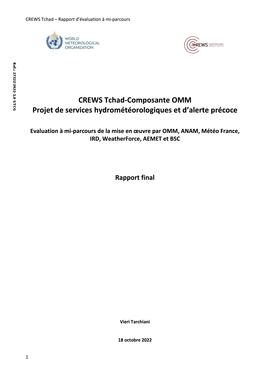Page Header
CREWS Tchad-Composante OMM Projet de services hydrométéorologiques et d’alerte précoce
Overview
The CREWS Chad project focuses on strengthening national capacity to provide climate, hydrological, meteorological and early warning services to selected sectors and communities. It is implemented jointly by the World Meteorological Organization (WMO) and the World Bank. With a budget of 1,500,000 USD, the WMO component is implemented in partnership with the National Meteorological Agency (ANAM) of Chad, Meteo-France (MF), the Institute of Research for Development (IRD), AGRHYMET, the Spanish Meteorological Agency (AEMET), Barcelona Supercomputing center (BSC), WeatherForce (WF) and involves focal points from national stakeholders such as the Water Resources Directorate (DRE), the Civil Protection Directorate (DPC), the National Agency for Supporting Rural Development (ANADER) and the Information System on Food Security and Early Warning (SISAAP). The project officially started on September 24, 2019, for a duration of 60 months. As part of the project, this mid-term review was planned to provide the status, key findings and lessons learned from the first phase of project implementation, recommendations for the second phase and for the final evaluation. The mid-term evaluation covers the period September 2019 - June 2022. The proposed approach for the mid-term and final evaluation of the project is consistent with the Norms and Standards for Evaluation defined by the United Nations Evaluation Group. The evaluation is based on an understanding of the intervention logic, considering the characteristics of the Chadian context, including the country's climate, hydrology, environment, policies and socio-economic conditions. The methodology is based on the five OECD DAC evaluation criteria (relevance, effectiveness, efficiency, impact and sustainability). On this basis, evaluation questions have been formulated with indicators and the benchmarks against which the project is assessed.Report Details
| Year Published | |
| Type | |
| Joint | No |
| Partner/s | N/A |
| SDG/s | |
| Consultant name | |
| Agency Focal Point | Alok OJHA |
| Focal Point Email | ioo@wmo.int |
| Managed by Independent Evaluation Office | No |
| Geographic Scope | Country |
| Country/ies |
YOU 'RE READING
CREWS Tchad-Composante OMM Projet de services hydrométéorologiques et d’alerte précoce











